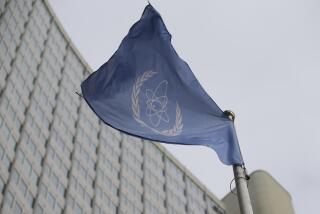Iran relations with IAEA turn contentious
Reporting from Beirut — Iran has dramatically shifted its public tone toward the United Nations’ nuclear watchdog, dropping its previous deference while harshly criticizing the agency’s latest report and its new director-general as an incompetent and biased lackey of the West.
On Sunday, Iran’s supreme leader and highest authority, Ayatollah Ali Khamenei, lashed out at the International Atomic Energy Agency, which monitors Iran’s nuclear program and adherence to the international Nuclear Nonproliferation Treaty, in a move that could signal a further deterioration of cooperation between the agency and the Islamic Republic.
“The IAEA reports indicate this international body is not independent,” Khamenei told Iranian diplomats in Tehran. “The IAEA should not bow to pressure from America and some other countries because such unilateral actions will harm the reputation of the IAEA and the United Nations.”
Japanese diplomat Yukiya Amano took the reins at the Vienna-based agency in December after the 12-year tenure of Egyptian Mohamed ElBaradei ended. The agency delivered its first report under his leadership on Feb. 18, explicitly suggesting for the first time that Iran was trying to build a nuclear bomb, citing its failure to clear up questions about a set of documents purportedly showing that Tehran was conducting experiments consistent with a clandestine nuclear weapons program.
Iran, which contends that the documents are forgeries, responded by focusing on Amano.
“Mr. Amano is a nonstarter and a novice,” Foreign Minister Manouchehr Mottaki told the state-owned Arabic-language Al Alam television news channel last week. “He still needs time to become as seasoned as Mr. ElBaradei. Mr. Amano has drafted his first report since taking office, and he has a long way to go to find a precise knowledge of [Iran’s nuclear] issue.”
Iranian authorities say they have no plans to pull out of the Nuclear Nonproliferation Treaty or significantly reduce their cooperation with inspectors. Instead, Iran’s hard-liners appear to be questioning Amano’s integrity as a way to pressure him and rally potential supporters on the IAEA’s Board of Governors and on the United Nations Security Council.
Iran is at odds with the West over its nuclear program, which the United States and its allies allege is meant to produce nuclear weapons. The U.S., Russia and France accuse Tehran of spurning a U.N.-backed offer to exchange the bulk of Iran’s low-enriched uranium for fuel plates for an Iranian medical reactor. On Tuesday, Iranian President Mahmoud Ahmadinejad repeated an offer to conduct the fuel exchange on Iranian soil, a condition the U.S. has rejected.
Tehran says it doesn’t trust the international community, that the Iranian program is peaceful and that it will continue producing enriched uranium. Enriched uranium can fuel a nuclear reactor or, if highly refined, provide fissile material for an atomic bomb.
The head of Iran’s Atomic Energy Organization last week announced plans to begin construction of two new uranium enrichment plants in the Persian calendar year beginning March 21, and he identified 18 other sites for potential nuclear fuel production facilities.
Iranian officials want the IAEA to help Iran obtain more fuel for its faltering medical reactor, which is about to sputter out.
“The member countries of the agency should have rights, in return for not pursuing military goals in their nuclear activities,” Foreign Ministry spokesman Ramin Mehmanparast said Tuesday. “One of the rights that the agency should provide is to ensure their peaceful nuclear needs. One of the duties of the agency is to provide the Tehran research reactor with fuel.”
But Iran’s demands for international help, and its plans to expand its nuclear program, come at a nadir in relations between Tehran and the IAEA.
The agency’s latest report to its board recounted repeated instances of disagreements between inspectors and Iranians over the last three months.
Experts acknowledge that the latest report was more assertive in highlighting the agency’s complaints about Iran’s nuclear program and less willing to acknowledge instances of its cooperation.
One influential Iranian lawmaker, Alaeddin Boroujerdi, who heads the parliament’s National Security and Foreign Policy Commission, called the latest report the “worst in the last six years” and referred to the grueling, months-long succession battle that preceded Amano’s election, which pitted the West and its allies against the developing world.
“You failed three times to gain the vote of confidence of the Board of Governors for your current position, and we believe the reason for that failure is reflected in your report,” Boroujerdi said of Amano, the Fars News Agency reported.
In a Feb. 21 address to lawmakers, parliament Speaker Ali Larijani denounced the latest agency report as a collection of lies serving the interests of Western powers. “The important question is how they have gathered so much false information in several months,” he said in a state radio broadcast.
The attacks against Amano may be aimed at putting pressure on him to soften the tone of future reports.
“The new director-general of the International Atomic Energy Agency keeps away from a clear statement on Iran’s peaceful nuclear activities in order to keep the members of the U.N. Security Council happy,” the hard-line daily newspaper Javan said last week. “This approach might guarantee the director-general’s continuation in his post but will undermine the reputation of the international organization.”
More to Read
Sign up for Essential California
The most important California stories and recommendations in your inbox every morning.
You may occasionally receive promotional content from the Los Angeles Times.










